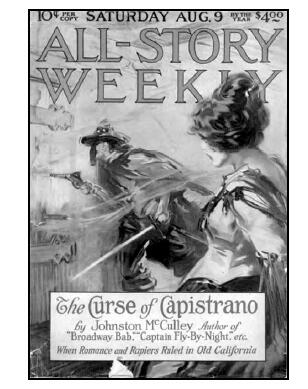Ip and Art: an International Perspective
| Publication year | 2023 |
| Author | Cristina Manasse |
AUTHORS
Cristina Manasse
Manasse Studio Legale, Italy
James C. Roberts III
Global Capital Law Group PC
When a judicial opinion on the parody defense comes along about one of our favorite childhood heroes, then it might be worth examining. Who could turn away from judges opining on Zorro? This time it is a December 2022 opinion of the Italian Supreme Court.1 This column will focus primarily on the contributions to the legal theory of the "parody" defense, viz., just what is parody in EU jurisprudence, especially in Italy.
By way of background: In 1919, Johnston McCulley introduced Zorro to American audiences in a short story, which then became the basis for the first movie of the new movie studio, United Artists, with Douglas Fairbanks co-writing, producing and acting in the movie, The Curse of Capistrano. The story was then redone as a book and it sold over fifty million copies. McCulley went on to write more than fifty more Zorro stories until his death in 1959.2

Figure is cover from All-Story Weekly vol. 100 #2 (August 9, 1919) - vol. 101 #2 (September 6, 1919).
[Page 44]
The intellectual property rights in all things Zorro are a bit messy, arising from several notable lawsuits, in which there were claims—and judicial holdings—that some of McCulley's works were in the public domain and some had been assigned. In any event, it does seem that McCulley transferred his rights to the individual whose descendants formed Zorro Productions, Inc. ("ZPI"), which became the plaintiff in this saga in the Italian courts. Over the course of more than fifty years, ZPI has commercialized rights related to Zorro, including multiple lawsuits, but also licenses for Zorro's use, e.g., an agreement with Coca-Cola for use in the category of non-alcoholic beverages. ZPI held not only copyrights, but also registered trademarks. Suffice it to say that some of the Zorro stories are probably in the public domain and others are probably not and that ZPI probably holds rights in Zorro sufficient for it to license those rights and obtain legal protection.
In general, parody means conveying a message to an audience by poking fun at a previous work. But humor can have other uses: Is "ridicule" the same as humor? Saturday Night Live might be funny but that humor might also be satirical. Parody and satire can be contrasted in a simple way: where satire attacks with absurd, snarky and even mean revisions of a prior work, parody conveys its message through more humorous means. Consider parody as part of a cluster of overlapping terms (think: Venn diagram) including satire, travesty, pastiche, skit and burlesque.3
The Oxford English Dictionary defines parody as imitation
[...] turned as to produce a ridiculous effect. Because par- also has the non-antagonistic meaning of beside, "there is nothing in parodia to necessitate the inclusion of a concept of ridicule."
Another "definition," closer to the American approach to parody, notes the contradictory relationship between the prior work and the parodic work:
[a] parody is defined as a simple form of entertainment conveyed by juxtaposing the irreverent representation of the trademark with the idealized image created by the mark's owner. A parody must convey two simultaneous—and contradictory—messages: that it is the original, but also that it is not the original and is instead a parody. [citations omitted] This second message must not only differentiate the alleged parody from the original but must also communicate some articulable element of satire, ridicule, joking, or amusement.4
More to the point, the European Court of Justice ("CJEU") has identified two essential characteristics of parody: to evoke an existing work while being noticeably different from it and to constitute an expression of humor.
The essential characteristics of parody, are, first, to evoke an existing work, while being noticeably different from it, and secondly, to constitute an expression of humour or mockery. The concept of 'parody,' within the meaning of that provision, is not subject to the conditions that the parody should display an original character of its own, other than that of displaying noticeable differences with respect to the original parodied work; that it could reasonably be attributed to a person other than the author of the original work itself; that it should relate to the original work itself or mention the source of the parodied work.5
American courts tend to find in favor of parodies for many reasons, especially First Amendment protections. Driven by the longstanding push for harmonization of laws with the European Union-including important CJEU parody cases such as Deckmyn, EU member state courts have in recent years moved in the same direction, adopting a similar approach with the right of freedom of expression enshrined in the EU's charter. But the fundamental right is integrated into a balancing test, between the important rights of the original author and the freedom of expression of the parodist.
[Page 45]
This case bounced back and forth between the appeals courts and the Italian Supreme Court for some fourteen years. It started in a trial court in 2007, when ZPI sued the Italian company, Compagnia Generale Distribuzione s.p.a. ("Cogedi"), alleging infringement by an ad campaign centering on an actor dressed in an ill-fitting Zorro outfit holding (but not drinking) a bottled water product. The trial court judge sided...
To continue reading
Request your trial
